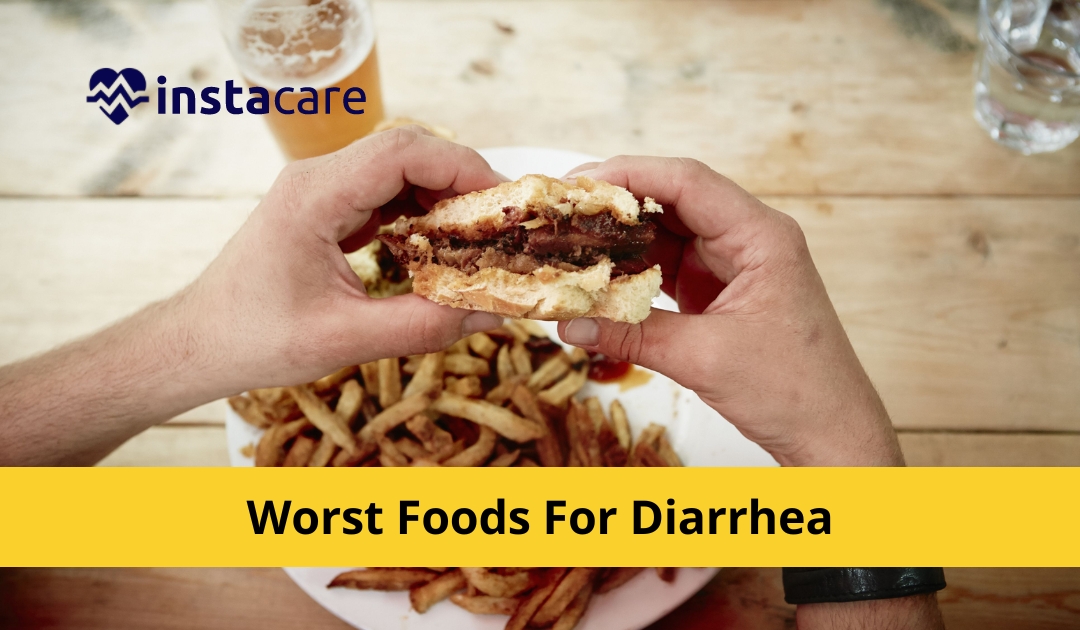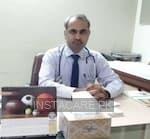It's an awful feeling when you're struck down with a stomach bug and suffer from severe diarrhea. Eating the wrong foods can make symptoms worse, so it’s important to know which ones are better avoided if you’re already dealing with an upset stomach or diarrhea. To help ease your stress and discomfort, this blog post offers advice on the top 10 worst foods for those suffering from diarrheal illnesses – as well as some healthier alternatives that will nourish you during your recovery period. By taking special care of what goes into your body while sick, our tips can help alleviate tightness and pain in the abdominal area; read on as we provide guidance on how to stay safe wherever possible!
What is diarrhea?
Diarrhea is a common medical condition that can be caused by an infection or ingestion of something that is not easily digestible. In adults, it commonly occurs due to the body's inability to process certain foods like dairy or artificial sweeteners. It is characterized by frequent, loose and watery stools that occur out of the norm for an individual—with slight variations depending on whether it is chronic or short-term. Diarrhea can be mild or severe and progrers rapidly in some cases and may become dangerous if left untreated as severe dehydration can cause additional complications. Therefore, it is vital to see your doctor should you experience any unusual symptoms associated with diarrhea for an accurate diagnosis and effective treatment plan.
Types of diarrhea
Diarrhea is a common medical condition that affects millions of people each year. While most episodes of diarrhea are mild and easily treated with simple home remedies, some cases can be more serious and involve infections. There are different types of diarrhea, including
- Osmotic diarrhea
- Secretory diarrhea
- Persistent diarrhea.
Osmotic diarrhea occurs when too much fluid accumulates in the small intestine and gets passed through the large intestine without being absorbed properly. Secretory diarrhea is caused by a release of certain chemicals, damaging the lining of the small intestine and preventing normal absorption of fluids. Persistent diarrhea is prolonged over time and can typically be traced back to an underlying problem such as an infection or a food intolerance. Taking steps to identify the cause of persistent abnormal bowel movements can help prevent future episodes from occurring.
View More: 10 Foods To Avoid With Diverticulitis
Causes of diarrhea
Diarrhea can be caused by a variety of factors, such as bacteria, viruses, or parasites ingested through food or drink. Viral gastroenteritis is one form of sickness associated with diarrhea that happens when a virus infects the gastrointestinal system. Other forms of viral infections such as rotavirus, Norovirus and Salmonella may also be culprits. Parasitic infections such as Giardia Lamblia are often found in people who consume contaminated water. Eating specific types of foods can also cause an upset stomach resulting in diarrhea. Such trigger foods include dairy products, spicy dishes, fruits and vegetables high in insoluble fibre or sugar alcohols like sorbitol or mannitol. Stress can lead to diarrhea as well due to changes in the body’s hormones and metabolism levels. Finally, some medications can cause side effects resulting in loose stools or the inability to absorb fluids properly leading to dehydration.
Symptoms of diarrhea
Diarrhea is an uncomfortable GI symptom that can interfere with anyone's daily routine. Common signs of diarrhea include loose, watery stools, cramping in the abdomen, gassiness, nausea, and feeling uncomfortably full after only a few bites of food. Other symptoms related to diarrhea can include dehydration from fluid loss and fatigue from inadequate nutrition. To help minimize these unwanted side effects of diarrhea, it is important to stay hydrated by drinking plenty of fluids and replenishing electrolytes when needed. If you notice that any GI symptoms like those mentioned above are holding you back from living your life to its fullest potential, consider making an appointment with your doctor for a comprehensive exam to determine the best treatment plan for you.
View More: 7 Foods That Help Men Gain Muscle Mass
10 worst foods for diarrhea
1- Fatty Foods
Fatty foods are a common trigger for diarrhea and avoiding them can be beneficial in controlling its symptoms. Fried foods, takeout meals, cheese, pastries, full-fat milk and fatty meats are some of the worst foods for those with chronic diarrhea. Eating baked goods is also a no-no, as they often contain troublesome preservatives and added sugar. To stay healthy, it is best to stick to lightly cooked lean proteins such as skinless chicken breast or separate broths made from lean meat along with non-starchy vegetables whenever possible during bouts of diarrhea.
2- Milk and Butter
Milk and butter are among the worst foods for diarrhea. Dairy products can worsen inflammation in the digestive system since they contain lactose, a sugar found in milk that many people have trouble digesting. Butter contains saturated fats that are difficult for the body to process and can trigger diarrhea. Doctors suggest avoiding dairy and eating lower-fat options instead, such as plain yogurt with probiotics or almond milk. Additionally, individuals experiencing diarrhea should stay hydrated and consume small meals until their symptoms improve.
3- Ice Cream and Cheese
Ice cream and cheese can both be difficult to digest and the worst foods for diarrhea, as they contain certain fats that your body isn't able to break down easily. While it's tempting to indulge in cold, creamy ice cream during a hot day or in a gooey slice of cheddar cheese melted over the top of your meal, those suffering from diarrhea may want to avoid these foods for a little while. Eating ice cream or cheese could make diarrhea worse, especially if consumed in large amounts. It's best to opt for more easily digestible foods when possible.
View More: 6 Amazing Bitter Gourd or Karela Juice Benefits
4- Alcohol
Alcohol is not typically among the worst foods for those suffering from diarrhea, as long as the person avoids sugary drinks. Even so, moderation of alcohol consumption is always suggested when dealing with a digestive disorder. Too much alcohol can slow down digestion and adversely affect absorption, resulting in watery stools and other uncomfortable symptoms. It's important to note that all forms of alcohol – wine, beer, and spirits – can aggravate diarrhea; while some may believe beer to be a remedy, this is generally untrue and should not be used medically as part of any form of treatment. Instead, it's best to temper one’s habits when it comes to drinking and if signs or symptoms of diarrhea become too severe, seek medical assistance immediately.
7- Sodas
Sodas are one of the worst foods you can consume if you suffer from diarrhea. The high levels of carbonation in most sodas can exacerbate digestive distress and gas, while the sugar and caffeine found in some types can cause an electrolyte imbalance, leading to more complications. Despite being a refreshing beverage during the hot summer months, it is generally not recommended for those needing relief from intestinal upset – water and other hydrating liquids are usually better options.
6- Beans, raw vegetables
As inconvenient as it may be, diarrhea is a common occurrence for many people. When it does happen, you should choose your food carefully. Consuming beans and raw vegetables are some of the worst foods for diarrhea, as they can greatly increase gas production and cause bloating. Beans contain complex carbohydrates that cannot be broken down in the small intestine - the part of your digestive system most easily disrupted by diarrhea - so eating them may cause severe gastrointestinal discomfort. Similarly, raw vegetables contain cellulose and lignin fibers that can be hard to process when your intestinal muscles are weakened by diarrhea. To help reduce complications associated with bouts of diarrhea, its best to avoid beans and raw veggies and stick with easily digestible items such as toast, crackers or oatmeal instead.
7- Spicy foods
Spicy foods may be a tasty treat for many, but they can also wreak havoc on your digestive system. Research has shown that for people with diarrhea-predominant irritable bowel syndrome (IBS-D), spicy foods can worsen symptoms, making them one of the worst foods to eat with IBS-D. If you are accustomed to eating spicy foods and don't want to give them up entirely, it's best to adjust how spicy you make your dishes or opt for moderate intensity when adding spice only as needed.
8- Artificial Sweeteners
Artificial sweeteners are often considered unhealthy, but research has suggested that they may actually improve digestive health. These sweeteners are found in many of the worst foods for diarrhea because they provide the same sweetness without the sugar content. Not only do artificial sweeteners decrease sugar levels, which can help stabilize blood sugar and reduce bloating, but they also serve as prebiotics - compounds that stimulate helpful bacteria in your gut. As such, carefully adding certain artificial sweeteners to your diet may be a great way to regulate digestion and support intestinal health.
View More: Top 7 Foods to Increase Hemoglobin Naturally
9- Foods That Cause Excess Gas
Many everyday items from our diets can contribute to excess gas, most notably beans, vegetables like asparagus and broccoli, dairy products such as cow's milk and cheese, carbonated drinks and other sodas, and certain artificial sweeteners. Additionally, fried foods are not easily digested in the stomach and can cause bloating and discomfort. All of these worst foods for diarrhea are difficult to digest in our stomachs, resulting in food particles passing through undigested into the small intestine where bacteria will ferment the food particles that were not properly broken down by our stomachs. This fermentation process leads to more intestinal gas which is typically released through either burping or flatulence.
10- Foods That May Be Spoiled
Food poisoning is very common, and it often starts with a spoiled food. Knowing which foods may be spoiled can help you avoid becoming ill. Dairy products like milk, cheese and yogurt are some of the worst culprits for food spoilage; if these products have an unpleasant odor, an off-color or are lumpy in texture, it's best to discard them. Raw meat, poultry or fish that has been stored longer than two days can spoil quickly and can lead to diarrhea - one of the worst symptoms of food poisoning - so it should be avoided altogether if possible. Paying attention to the condition of your food and learning how to properly store items will help ensure you don't eat something spoiling and become ill.
Treatment of diarrhea
Treating diarrhea often requires discovering the cause of the problem. If a bacterial or viral infection is to blame, antibiotics or antiviral drugs may be prescribed by a doctor. In cases related to food intolerances or sensitivities, allergens will need to be identified and avoided in order to get relief. Over-the-counter medications are available that may also help relieve symptoms, as well as natural remedies such as peppermint tea or probiotic supplements. It's important to replenish lost electrolytes through replacing fluids, and eating foods such as rice, bananas, applesauce and toast—all of which help keep energy up while restoring fluids and helping with digestion. With the right treatment plan tailored for an individual's needs, sufferers can manage their diarrhea more effectively over the long term.
Best Foods to Eat in Diarrhea
When it comes to what to eat when you have diarrhea, it really depends on how bad the symptoms are. Generally speaking, foods that are easy on your stomach and provide some sustenance without being too heavy are best. Bland proteins like boiled eggs and skinless, boneless chicken or turkey can be good options. While some prefer sticking with bland carbohydrates like white rice and oatmeal, lean proteins help our bodies replenish electrolytes and also contain essential vitamins and minerals that help us stay healthy. Depending on personal preference, opt for low-fiber fruits like bananas, applesauce, cooked pears and canned peaches as a sweet treat. Eating small meals throughout the day will help keep your energy up and your stomach from rebelling against any infractions in the diet. At times of extended severe diarrhea, it may be best to follow an extremely limited diet of just liquids until symptoms subside. But do bear in mind that any extreme dietary change requires medical advice from a specialist physician beforehand.
Please book an appointment with the Best General Physician in Lahore, Karachi, Islamabad, and all major cities of Pakistan through InstaCare, or call our helpline at 03100002273 to find a verified doctor for your disease.












